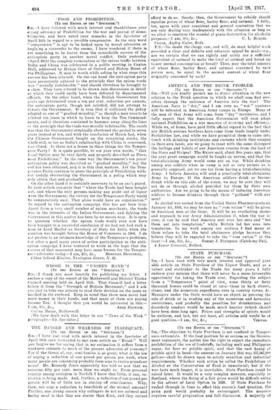FOOD AND PROHIBITION.
[To THE EDITOR OF THE " SPECTATOR.") SIR , —I have followed with much interest and thankfulness your strong advocacy of Prohibition for the war and period of demo- bilization, and have noted your remarks in the Spectator of April 14th in regard to a possible compromise. As the very word " compromise" is apt to be looked upon by moral advocates as implying a surrender to the enemy, I have wondered if there is not something to be learnt from the remarkable success of the anti-opium party in another moral conflict. Only yesterday (April 19th) the complete termination of the opium traffic between India and China was celebrated in a public meeting in Caxton Hall, addressed by Bishop Gore of Oxford and Bishop Brent of the Philippines. It may be worth while asking by what steps this success has been attained. On the one hand the anti-opium party have persistently adhered to the principle that the opium trade was "morally indefensible" and should therefore be brought to a close. They have refused to be drawn into discussions in detail in which they could easily have been defeated by departmental efficials. On the other hand, when the British Government ten scars ago determined upon a ten per cent. reduction per annum, the anti-opium party, though not satisfied, did not attempt to thwart the Government. It is true that it criticized the policy adopted as one of "gradual morality," as though a man were to be allowed ten years in which to learn to keep the Ten Command- ments, and it therefore continued to hammer away along the lines of the principle that the trade was morally indefensible. The result was that the Government eventually shortened the period to seven years instead of ten, and with the conclusion of March last, when the Chinese Government bought up the remaining stocks, the whole evil, so far as India's relationship with China is concerned, was closed. Is there not a lesson in these things for the Temper- ance Party ? It is quite possible, to use your own words, "that Local Option may be very fairly and properly described as Piece- meal Prohibition." In the same way the Government's ten years' anti-opium policy was described as "gradual morality," but the end has been obtained, and it is this that matters. Let the Tem- perance Party continue to press the principle of Prohibition with- out unduly obstructing the Government in a policy which may only attain that end gradually.
On the other hand it is certainly necessary to be on one's guard. In your article you state that "where the Trade had been bought out, and where the only persons making any profit out of liquor were the Government, the victory for the Temperance Party would be comparatively easy. They alone would have an organization." In regard to the anti-opium campaign this has not been true. Apart from a very small number of opium merchants, the trade was in the interests of the Indian Government, and fighting the Covernment in this matter has been by no means easy. It is open to question whether the opium trade would even now have been brought to a successful conclusion if we had not had such a man as Lord Morley as Secretary- of State for India when the question was brought before the House of Commons in 1906. I do not profess to an intimate knowledge of the Temperance problems, but after a good many years of active participation in the anti- opium campaign I have ventured to write in the hope that the success of that movement may have some lessons for the Temper- ance advocates to-day.—I am, Sir, &c., MARSHALL BROOMHALL.
China Inland Mission, Newington Green, N.16.


































 Previous page
Previous page